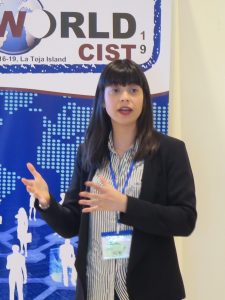Caritas Coimbra shared results on the usability of virtual assistants in WorldCist’19
Caritas Coimbra presented the result of its most recent research work, in the 7th Edition of the WorldCist’19 Conference, on April 16, 2019, on the island of La Toja, Spain.
The article “Usability evaluation of a Virtual Assistive Companion” presents the results of a usability study carried out in different social equipments of the institution, involving both users and professionals in the evaluation of the CaMeLi technology. The results suggest that virtual assistants, such as CaMeLi, are a promising technology for ageing in place, given their strong social interaction that facilitates social inclusion. The implemented methodology also allowed to extract a set of improvement suggestions that this technology will have to accommodate in the future, thus increasing its level of acceptance and adoption by its end users. The results of this research and the methodology applied will be considered in the evaluation protocol of the technological solution being developed in the DAPAS project, in which Caritas Coimbra is a partner.
DAPAS project aims to integrate the successful results of previous AAL community projects – Active Assisted Living, developed from different companies in different countries. These innovative solutions are being combined into a single product that can be distributed on a larger scale to improve the quality of life for many people.
DAPAS is co-funded by the European AAL Joint Programme (Active and Assisted Living Environments – ICT for ageing, 2017) and, in the portuguese case, by the Fundação para a Ciência e Tecnologia.
Cáritas de Coimbra also had the opportunity to disseminate some of its ongoing projects in the field of active ageing and improvement of the quality of life and health of older citizens, among which Toilet4Me (aimed at promoting the autonomy of older citizens through adapted sanitary facilities in public and semi-public spaces).
